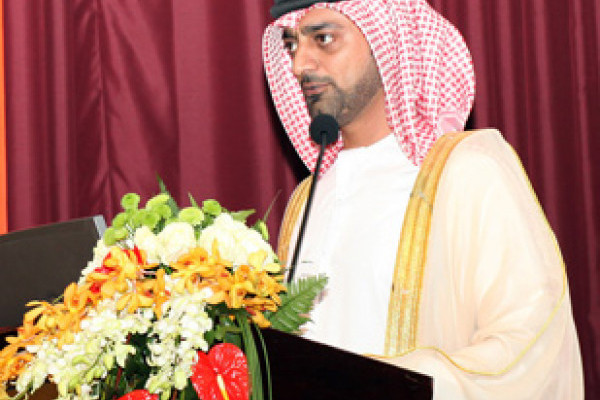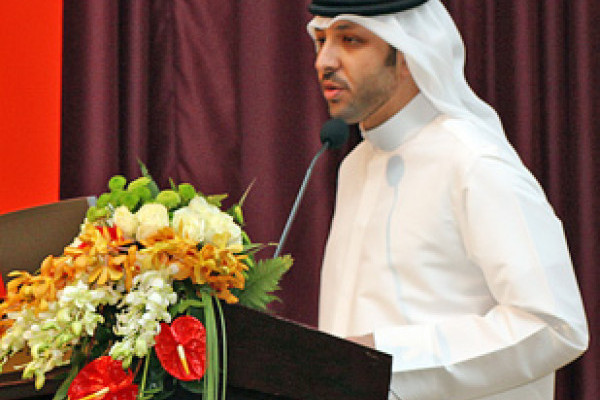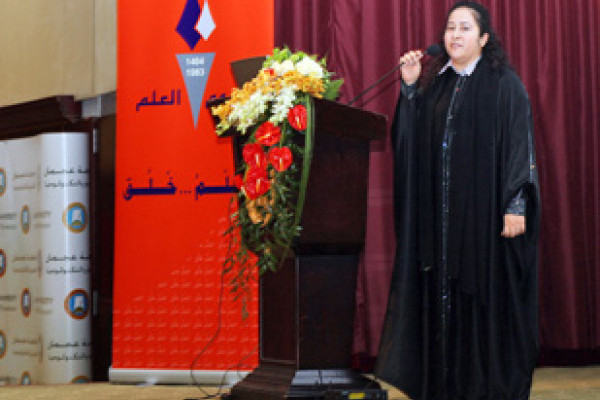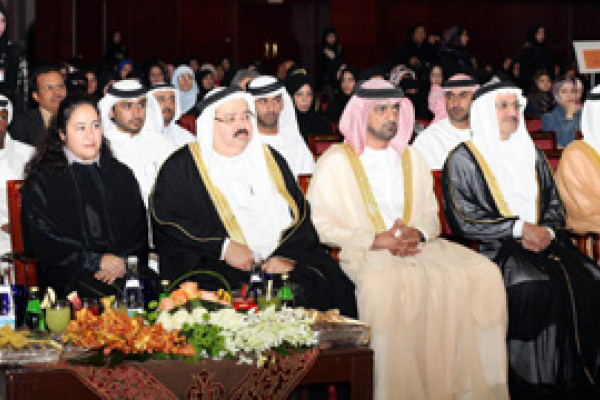His Highness Sheikh Ammar Al Nuaimi Opens "Women & E-Learning" Conference at Ajman University
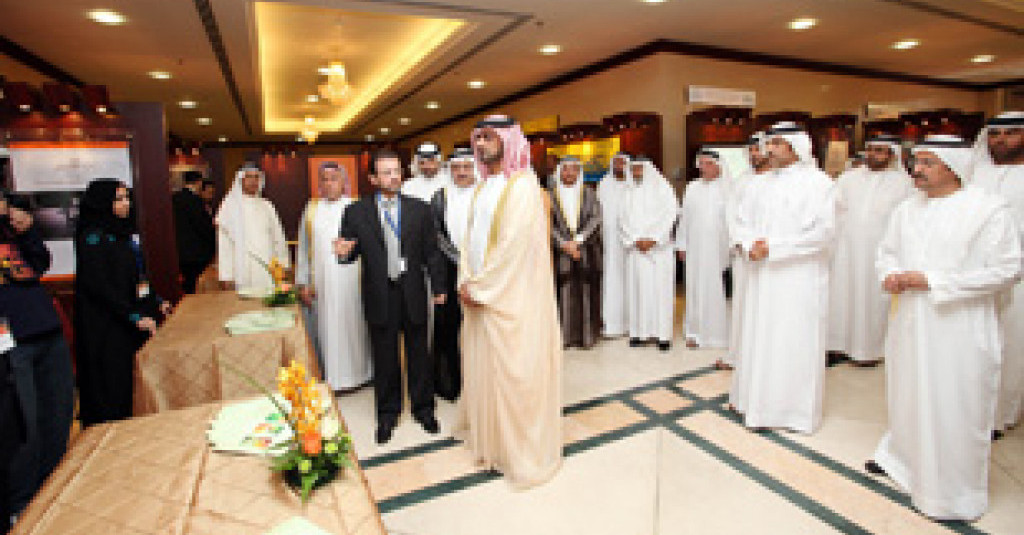
His Highness Sheikh Ammar bin Humaid Al Nuaimi, Crown Prince of Ajman and Head of the Executive Board, opened the conference, which was on the topic 'Women and E-Learning: Potentials & Challenges.' The event, organized by Ajman University of Science & Technology (AUST) in cooperation with Umm Al Mumineen Association, marks the celebration of the 24th Knowledge Day, which this year has the slogan 'Ethics are the Core of Knowledge' The conference was held under the patronage of His Highness Sheikh Humaid bin Rashid Al Nuaimi, Member of the Supreme Council and Ruler of Ajman, and in the presence of His Excellency Humaid Mohammed Al Qutami, Minister of Education; His Excellency Abdul Rahman bin Mohammed Al Owais, Minister of Culture, Youth and Community Development; Thamer Saeed Salman, AUST Vice President, as well as college deans and education directors. Also in attendance were Mrs. Rajaa Al Noman and Ms. Fatima Al Jassim, respectively Vice President and Director of Umm Al Mumineen Association, association directors and Managers, and a number of Sheikhs and dignitaries.
His Highness Sheikh Ammar bin Humaid Al Nuaimi and invited guests, including representatives of a number of companies specializing in virtualization technologies and e-learning, opened the conference exhibition. This was followed by the playing of the National Anthem and recitation of the Holy Quran. His Highness Sheikh Ammar then gave a speech on behalf of His Highness Sheikh Humaid Bin Rashid Al Nuaimi, Member of the Supreme Council and Ruler of Ajman, Patron of Knowledge Day and of the conference. In the speech, His Highness stated that it gave him great pleasure to know that those gathering for the conference are working to develop the skills and knowledge of the public in order that they might contribute actively to the development of society.
Following this speech, Thamer Saeed Salman, AUST Vice President for Administrative and Financial Affairs, gave a speech on behalf of His Excellency Dr. Saeed Abdullah Salman, President of AUST, in which he expressed his thanks to the patron of Knowledge Day and conference patron, His Highness Sheikh Humaid bin Rashid Al Nuaimi, for his patronage of science and education, including of Ajman University, which has been supported by His Highness since its foundation as a college in 1988 and through its development into a university with three dimensions: education, information and investment. Thamer Salman also thanked His Highness Sheikh Ammar bin Humaid Al Nuaimi, Crown Prince of Ajman and Head of the Executive Board, for his support in attending the conference. 'From its foundation,' he said, 'the UAE has realized the importance of science and established the foundations of scientific knowledge and growth.' Scientific advance, he stated, continues under the leadership of His Highness Sheikh Khalifa bin Zayed Al Nahyan, UAE President, his brother His Highness Sheikh Mohammed Bin Rashid Al Maktoum, Vice President of the UAE, Prime Minister and Ruler of Dubai and their brethren, members of the Supreme Council Rulers of the UAE.
Using the same approach, Thamer Salman stated, the conference aims to participate in the process of education and investment in Ajman in particular, and the UAE and Gulf region in general. 'For this reason,' he continued, 'we invite others to take advantage of our comprehensive vision based on the reform of education and other fields, because the identity of education is both public and private.' The introduction of e-learning at AUST, Thamer Salman said, is part of the advance of the university, and of the application of the university's integrated three-dimensional vision that helps create a comprehensive creative environment and ensures quality but with the expenditure of less time and effort. This takes place through the use of virtualization technologies, information technology, and an open education system that is different from traditional methods being not restricted by place and time.
Thamer Salman also stated that the result of applying e-learning, which started at AUST in 2006, has been the development of 684 courses on the 'Moodle' system, of which 466 are taught online. This is equivalent to 71 percent of courses across seven colleges; it is expected that this will increase to 100 percent by 2011. Moreover, he explained that through tracking the responses of students to the online courses, it has been found that the number of students interacting electronically at AUST's Ajman campus is more than 3,000 per day, and the number is increasing each semester. In the past four years AUST has also applied e-learning in many workshops, training faculty to teach online. The university is also considering the adoption of international standard certificates in e-learning requirements for each faculty member, for example the 'Moodle' certificate. This 'virtual environment' is the clearest embodiment of AUST's aspirations.
Thamer Salman also congratulated the conference organizing committee members from Umm Al Mumineen Association and at AUST on the choice of the conference topic and praised the excellent cooperation between the two parties. He added that the experience of e-learning at AUST showed that women, both students and faculty members, are not less enthusiastic than their male counterparts; in fact their interest may even exceed that of men.
Her Excellency Sheikha Dr. Eashaa Al Khalifa, Vice President of Royal Bahrain Girls School and Dean of the Faculty of Information Technology, from the Kingdom of Bahrain, was keynote speaker at the conference's opening session. She talked about e-learning as a shift in teaching and learning, and highlighted the fact that rapid development in modern technology, particularly electronic technology, has spread the belief that education can be transmitted from the classroom and books to the electronic world with little adaptation. She stated that scientists and researchers have discovered over time that modern technology has disadvantages and advantages, especially when compared to traditional education. She reviewed the results of a number of experiments that lead to practical conclusions that can be applied directly so as to allow e-learning to facilitate and encourage the process of acquiring information and skills by the learner in general, and women in particular. Moreover, educational and teaching methods and the presentation of information need to be developed so that the student can acquire knowledge easily. She added that the resources of the Internet have not yet been fully exploited; more syllogistic research is required to enable the Internet to be used more interactively in education. However, presentation methods must suit the environment of each institution and be in line with the identity and values of society.
The day's first session, 'Types of e-learning and their Role in the Development of Teachers and Students,' was presented by Dr. Ahmad Dabbagh, Director of the E-Learning Services Department at AUST, and Dr. Zahreya Shanaa of the College of Education and Basic Sciences at AUST's Fujairah Campus. In the second session, Dr. Tharwat Al Sakran from the American University of Sharjah addressed the topic 'Women & E-Learning' and Dr. Hakim Khali, Dean of AUST's College of Information Technology, spoke on 'E-learning Applications in the World of Women.' The third session focused on 'Realistic Experiments in the Impact of e-learning on Guiding Women Towards Excellence,' which included three lectures presented by Ms. Sheikha Hamad Ghanem Moghawer, teacher of art education at Umm Ammar primary school in Ajman, who presented a lecture entitled 'The use of e-learning to promote environmental concepts.' Ms. Abeer Malkawi from the University of Khalifa presented a research paper entitled 'Electronic Communication with Students – Jordanian University as a Model,' and Ms. Basma Al Shehhi from Al Jurf Secondary School in Ajman presented a lecture entitled 'The use of e-learning methods in the teaching of physics.'
These sessions were followed by a discussion and reading recommendations.
